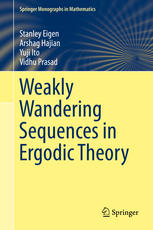

Most ebook files are in PDF format, so you can easily read them using various software such as Foxit Reader or directly on the Google Chrome browser.
Some ebook files are released by publishers in other formats such as .awz, .mobi, .epub, .fb2, etc. You may need to install specific software to read these formats on mobile/PC, such as Calibre.
Please read the tutorial at this link: https://ebookbell.com/faq
We offer FREE conversion to the popular formats you request; however, this may take some time. Therefore, right after payment, please email us, and we will try to provide the service as quickly as possible.
For some exceptional file formats or broken links (if any), please refrain from opening any disputes. Instead, email us first, and we will try to assist within a maximum of 6 hours.
EbookBell Team

4.8
94 reviewsThe appearance of weakly wandering (ww) sets and sequences for ergodic transformations over half a century ago was an unexpected and surprising event. In time it was shown that ww and related sequences reflected significant and deep properties of ergodic transformations that preserve an infinite measure.
This monograph studies in a systematic way the role of ww and related sequences in the classification of ergodic transformations preserving an infinite measure. Connections of these sequences to additive number theory and tilings of the integers are also discussed. The material presented is self-contained and accessible to graduate students. A basic knowledge of measure theory is adequate for the reader.